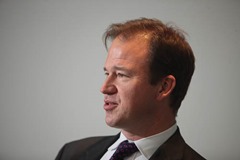Rediscovering real capitalism
 One of Parliament’s key economic thinkers, Jesse Norman is expected to enter government if the Conservatives win in 2015. agendaNi sums up his case for ‘real capitalism’ and an ethical economy.
One of Parliament’s key economic thinkers, Jesse Norman is expected to enter government if the Conservatives win in 2015. agendaNi sums up his case for ‘real capitalism’ and an ethical economy.
This crisis is not a mere economic downturn but a fundamental shift of value caused by excessive financial speculation and abetted by foolish political decision-making over two decades. Capitalism itself is widely held to be at fault.
In fact, capitalism is the greatest tool of economic development, wealth creation and social advance ever known. In capitalism, owners of intellectual, financial or human capital have property rights that enable them to earn a profit as a reward for putting that capital at risk in some form of free market economic activity.
The case for capitalism is not just economic and social; it is also moral. For many decades, capitalism has come under attack on moral grounds. It is said to be intrinsically immoral, and driven by greed; to be founded on theft, with the greatest capitalists mere ‘robber barons’; to create and perpetuate exploitation and inequality; even to be morally vacant.
Of course, abuses of capitalism often occur. But the bigger truth is that capitalism is at root a moral force for good. It relies on, and so demands:
• personal freedom and individual autonomy, the foundation stones of personal morality;
• the virtues of hard work, creativity and thrift;
• social exchange: traditions and practices by which intellectual, financial and human capital can be shared to best effect;
• institutions such as the rule of law and the family that preserve property over time;
• effective government to create and enforce the law, to share social costs and, I would argue, to help the disadvantaged;
• a wider culture and a stable but fluid social order in which its virtues are respected and opportunity exists for all of energy and talent, that is for all.
In short, capitalism relies on, and so demands, trust. It does not exist to make the rich richer.
In recent years the Conservative Party has developed what amounts to a strong critique of crony capitalism and its effects. Attacking crony capitalism is not anti-business; it is pro-business.
The efficient markets hypothesis is not holy writ; human beings are creatures of habit; the social order is based on traditions, practices and institutions which escape economic specification. Culture matters: in the banking system, in the UK economy, in our society.
Pay is a litmus test of social norms, and excessive pay is a hallmark of crony capitalism.
To sum up: real capitalism is one thing, and crony capitalism quite another. Setting the right economic incentives is important. But so are virtuous habits. If we are going to get back to real capitalism, we need to focus as much attention on our culture and values as on our economy.
Abridged from ‘The Case for Real Capitalism’ published by the Free Enterprise Group of Conservative MPs





